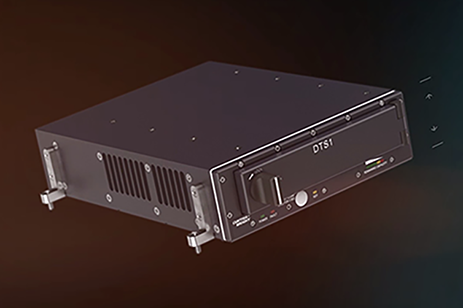
The DTS1 is an easy-to-use, turnkey, rugged network File Server that houses one Removable Memory Cartridge (RMC) that provides quick offload of data. The RMC can be easily removed from one DTS1 and installed into any other DTS1 providing full, seamless data transfer between one or more networks in separate locations.
Video Transcript
More than ever, sensitive data on unmanned platforms must be protected due to the inherent dangers associated with their missions.
Protecting that data becomes a challenging task as unmanned vehicles get smaller, limiting available space for subsystems.
Bulky data protection systems tend to take up more space, add more weight and cause more fuel to be consumed…dramatically shortening mission duration time.
And while unmanned vehicles are shrinking, the costs associated with data protection are constantly rising.
Developing a SWaP-optimized system with a new NSA-approved Type 1 encryption can significantly impact cost and schedule.
As the systems gets more complex, program cost and risk dramatically rise, as well as delaying deployment schedule.
The average development of a new NSA-certified Type 1 encryptor can drive up the cost by several million dollars and take up to 36 months to field.
What if you could deploy a solution that could:
- reduce the development risk and time?
- eliminate development cost?
- dramatically reduce SWaP?
- protect classified data-at-rest with a COTS file server now?
- have that COTS file server already certified by NIAP and reviewed by the NSA?
The DTS1, a COTS-based file server from Curtiss-Wright Defense Solutions delivers all these benefits and more. To reduce the long development time for Type 1 encryption, the DTS1 was engineered with Top Secret data-at-rest protection in mind in order to meet the requirements for NSA’s Commercial Solutions for Classified (CSfC) program.
The DTS1 follows the hardware and software full-disk encryption guidance and incorporates both layers into one device. Both layers employ approved Suite B algorithms and each layer uses separate authentication schemes.
For applications that do not require two layers of encryption, the DTS1 is available with hardware full-disk encryption only.
The DTS1 delivers a small, compact system that measures just 1.5 inches tall and less than 48 inches cubed, weighing in at just over 3 pounds. And uses less than 15 watts of power when configured with a 2-terabyte SSD within Curtiss-Wright’s durable removable memory cartridge.
Making it the ideal choice for SWaP conscious integrators. And because unmanned vehicles come in all shapes and sizes, multiple mounting options are available.
Making it easier to adapt the DTS1 for almost any application. The DTS1 is powered by 28-volt DC for mobile applications.
With two 1 gigabit Ethernet ports, the DTS1 can be the file server in a net-centric system.
To support file serving needs, the DTS1 supports industry standard protocols like NFS, CIFS, FTP, and HTTP.
The DTS1 also supports the PXE protocol, providing boot files to all network clients, eliminating the need for local storage in each client, thus providing SWaP saving for UAV or UUV applications.
It can support iSCSI for applications requiring block control.
For applications requiring complete Ethernet packet capture, the DTS1 supports PCAP protocol.
The storage disk can be partitioned so that files, blocks, and packets can be kept separate from each other for easier access.
With support for both full-disk hardware and software encryption, common criteria certification and NSA CSfC review. The DTS1 is an affordable and powerful COTS file server for UUV and UAV applications where data-at-rest must be protected.
This compact, flexible file server is ready to protect critical data and can be easily integrated into any platform reducing the size, weight, and power associated with traditional approaches.
And the investment by Curtiss-Wright into this highly engineered file server significantly reduces your development time, program costs and technical risks.
This makes the DTS1 COTS file server ideal choice for protecting classified data on deployed unmanned platforms today.